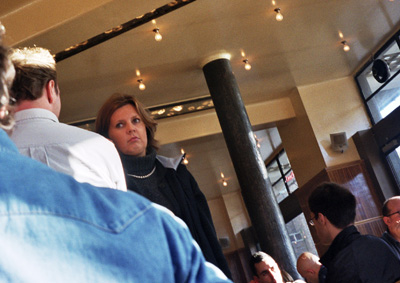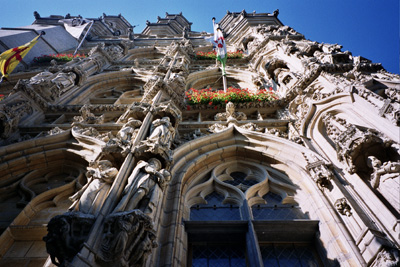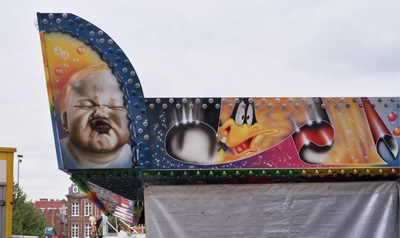About two weeks ago, I had an entry called “It From Bit” or “It From Qubit”? Part 1.. Today I want come back to that topic and finish it off.

[Today's pictures are from Belgium, this particular one shows some strangers in a cafe. I like the expression on the woman's face. “It from bit?” she's thinking.]
David Deutsch argues that quantum computation is going to better at modeling the universe than classical computation. Quantum computation is built up from so-called qubits instead of bits. A qubit can be 0, 1, or some mixture of the two. The big win, says Deutsch, is that our world is already made of quantum mechanics, so a quantum computer can not only emulate any physical system, it can in some sense be a copy of any physical system. With digital classical computer simulations, there’s always the worry that you’re only running a simplified version of the world.

What does a quantum computer look like? Well, they barely exist, so far, and it’s not clear that they’ll ever be usable. In the current laboratory experiments, a half dozen supercooled atoms might be held suspended in a line in a so-called ion trap. And the experimenter shines pulses of laser light onto the ions, and eventually one of the ions might spit out a photon or flip over, and that’s your output.

What seems to me like a kind of flaw is that, at least for this style of quantum computer, the thing isn’t self-contained. The program isn’t stored inside the system. The pulses of laser light are both the program and the data. Of course I have to load programs into my desktop computer or my walk-around robot. But once those programs are in there, the system can go off on its own and function autonomously. I don’t see that happening in at least the current descriptions of quantum computation.

In some sense it’s easier to say the universe is a quantum computation instead of a classical computation with sharp-valued digital bits. For the universe as we know it seems to be made of quanta. But as Wolfram remarked to me recently, this doesn’t mean there couldn’t be a digital substrate. He says that trying to smuggle quantum mechanics into the lowest level of reality is a bit like the heliocentrists’ desperate attempts to preserve their unwieldy system by tacking on epicycles to the planets’ motions. Maybe at the lowest level we can just let go of the quantum system and get something really clean and crystalline.










November 30th, 2005 at 6:53 pm
Maybe at the lowest level we can just let go of the quantum system and get something really clean and crystalline
It seems like the deeper we go into physics it always gets more mysterious not simple and clean.
The program isn’t stored inside the system.
Do you think that quantum computers preclude VonNeuman type architectures? Or do you think it is just this generation. I think I have read about memory device applications of quantum devices like the ones that could be used for quantum computation. Then again isn’t the memory the state in some sense?
December 1st, 2005 at 8:30 am
It could be that physics keeps getting worse as we go down. Why not? I’m also thinking there could be no lowest level, and endless fractal.
In the descriptions of quantum computers I’ve read, the so-called “gates” aren’t fixed material things. They’re, rather, actions that are imposed on the system from the outside.
It’s almost as if you’re supposed to build a computer with a single NAND gate, and “run” it by delaying signals and rewired them to the gate over and over.
Maybe there is a description of as self-contained quantum computer with Von Neumann architecture, though.
August 16th, 2008 at 8:20 pm
Heliocentrists are those that maintain that the sun is at the center of the universe.
I think.
September 19th, 2011 at 12:22 am
The church has a classic architecture. The way early people make their constructions are superb imagine they don’t have the technology that we have today but these things still stood tall in different areas around the world. Nice set of pictures and article as well.